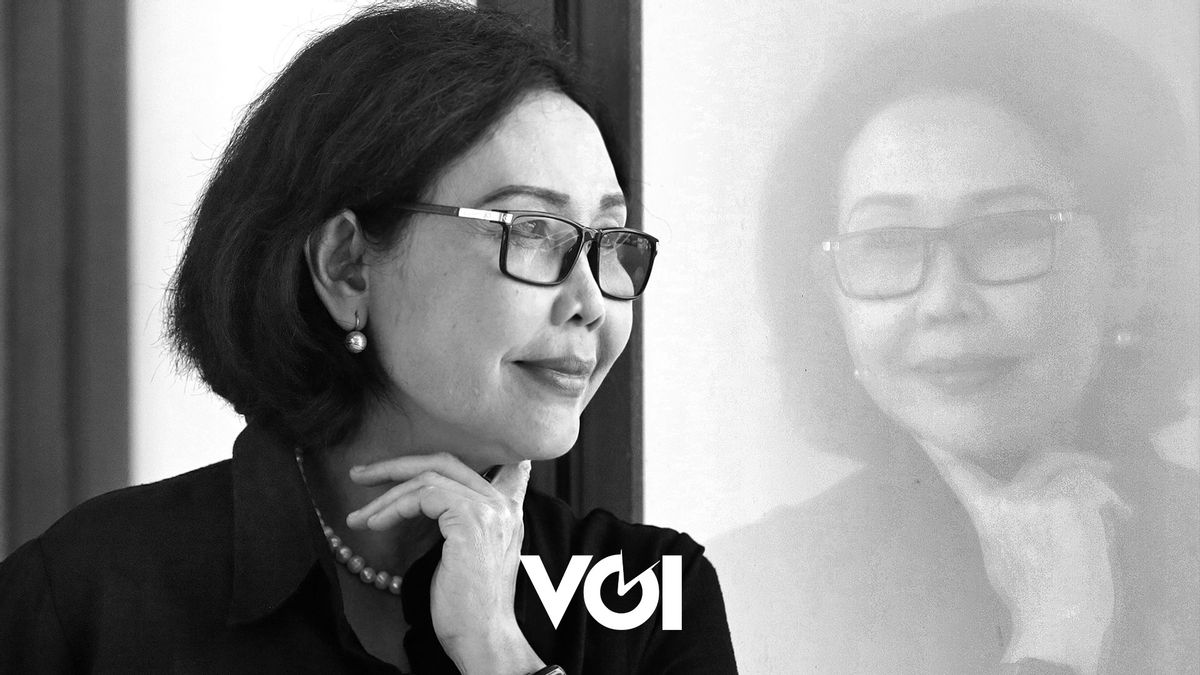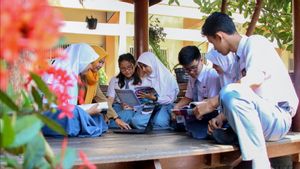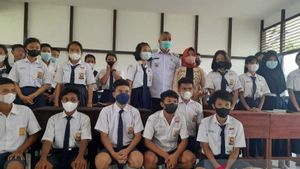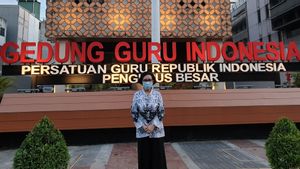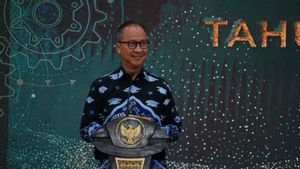Changes in ministry are usually followed by changes in curriculum and policies. If this happens, it will be a hassle for teachers and students. In fact, said the General Chairperson of the Board of the Indonesian Teachers Association (PGRI) Prof. Dr. Unifah Rosyidi, M.Pd., the current priority is not curriculum or policy changes, but how the infrastructure and educational facilities are improved and evenly distributed so that the quality of education can be better.
***
The COVID-19 pandemic, which has hit Indonesia and the world for two years, has made many changes in various fields, including education. Face-to-face learning (PTM) turned into distance learning (PJJ). PJJ indeed has many shortcomings compared to PTM, but this situation must be done. The problem with the territory of Indonesia which consists of many islands, and the uneven distribution of infrastructure, especially the internet network, makes PJJ a problem in itself.
That's why Unifah Rosyidi, who is also a professor at the State University of Jakarta, criticized the policies that often occur when there is a change of ministers, in this case, the Ministry of Education, Culture, Research, and Technology.
“Right now, what is urgent is not changing the curriculum, but how we all realize that Indonesia, which consists of islands, is connected to the internet, which is cheap and equitable for our children. We have to focus on building internet network infrastructure. If you need free internet during study hours," she said.
Then, according to Unifah, the welfare of teachers is still very concerning. The root of the problem is that the government has no good intentions to solve this problem. Certification used to be considered as a solution for teacher welfare. However, in practice, the regulations used to achieve this are now increasingly difficult. Teacher certification, which used to be one of the roads to prosperity, is now far from being expected.
The challenge of being a teacher in today's era is not easy. Public expectations still want teachers to play more roles, but on the other hand, the welfare of teachers is still a concern. What are the problems faced by our teachers and education, especially during this COVID-19 pandemic? To Iqbal Irsyad, Edy Suherli, Savic Rabos and Rifai from VOI, Unifah Rosyidi shared ideas when visited at the PB PGRI office, Tanah Abang, Central Jakarta recently. Here is the full excerpt.

The COVID-19 pandemic is already two years long, how do you observe the impact on our education?
In fact, the COVID-19 pandemic, which has been around for two years, has not only affected Indonesia but various countries in the world. The impact in the world of education is extraordinary. Research submitted by UNESCO, the World Bank, and the Ministry of Education as well as by ourselves (PGRI), the most noticeable is loss of learning. The impact on social and emotional problems of our children because they can not interact with their friends. The economic situation is also declining, early marriages occur, and what is most noticeable is the literacy gap in the achievement of learning outcomes because children in the area do not have broad access as children in urban areas. They do not have a gadget and the purchasing power of their internet quota is very low.
So far, the tug-of-war, whether the learning process is carried out online or offline is still an interesting theme. For you as an educator, how do you give understanding to PGRI members?
The teacher in this case is relatively mature in dealing with the situation. Safety of all is the main concern. Therefore, distance learning (PJJ) and learning at home when the PPKM level is high are the most realistic options. The problem is how do we prepare quality PJJ as a way to minimize the impact of the pandemic.
The problem is, as you said earlier, not all regions and cities are the same, especially since Indonesia, which is spread from Sabang to Merauke, has very diverse conditions?
That's why I want to say that what is urgent now is not changing the curriculum, but how we all realize that Indonesia, which consists of islands, is connected to the internet, which is cheap and equitable for our children. I call it we must focus on building network infrastructure, the internet backbone. If you need free internet during study hours.
How to? I think the Ministry of Education, Culture, Research, and Technology knows what to do. Network infrastructure, the quality of learning, and teaching materials are very important, how the training for teachers in using the learning platform should be the focus. Therefore, PGRI as a partner of the government, both at the central and regional levels, always reminds us that our focus is not on changing the law. Our focus is not on improving or changing the curriculum, but on how to deal with the situation due to the pandemic, which is likely to be a long-term solution.
Face-to-face learning can't be compared to PJJ, how to minimize its shortcomings?
I want to draw to the current emergency situation, yes definitely lost a lot. Because the new educational process feels like an educational process, if there is dialogue, mutual support, and encouraging children to grow. That's what feels so lost. But education experts are also trying to find ways to minimize this, that's why it is blended. At certain times when the situation is safe, in the classroom, the teacher no longer gives lessons, because the lessons can be found by the children by reading. But solving problems, including children's problems, raises enthusiasm, encourages growth and development, encourages children to be engrossed in learning. So the interaction is established.
Sometimes because we were brought up in full class, during the current pandemic, we feel very lost. But we have to be realistic now. When we interact in class it is used to cover the shortcomings of PJJ and build understanding, encouraging children's growth. To appreciate and solve problems in the style of children accompanied by teachers. That's actually what has to be turned on, but it's not easy. Need to change the way of teaching.
So the teacher, the teacher, needs to be introduced to these ways. That's why I have repeatedly said that in the current situation, it is better if we focus on improving the blended learning model, and internet access that reaches our children. So how the situation of this learning process changes, but does not lose its meaning.

So focus on improving infrastructure and quality of education?
Yes, this is what we have said many times, it may or may not be possible for the ministry to be tempted to change the curriculum. It can still be an important legacy because it is currently in a state of crisis. So the Ministry builds this education system in the future, starting when it is in a state of crisis. It doesn't have to be a curriculum change to create that legacy.
During these two years of the COVID-19 pandemic, what has been the evaluation of our education implementation?
We hear reports from administrators at various levels in one meeting or we conduct small surveys. What I say is the result of our evaluation. The teacher longs to be trained and cared for, we need a new innovation in learning. Then the bad management of teachers, teachers who feel they are not getting welfare, etc. This is a way of evaluation that we get from the ground up and we bring to the central level for attention. We need to improve the learning model, minimize deficiencies (PJJ), so that later we can walk together after the situation is normal.
The problem of teacher welfare at this time has not improved?
PGRI has had its ups and downs fighting for the law on teachers and lecturers in which it is explained that teachers who have been appointed by the state or private sector are entitled to receive (benefits), with certain conditions. So it is stated that within 10 years the teacher certification must have been completed. In fact, from the current number of teachers, the number of honorary teachers is more than ASN teachers. Only 50 percent of public schools can get the certification. So this is also a problem, not all teachers have received it. Even 50 percent less. This is a problem and causes segregation (exclusion). So some feel left out. It has been going on since 2006. Until now, there is still around 48 percent of teachers who have not been certified and it is increasingly difficult to obtain them. So overall for the welfare of teachers it is very very concerning.
What's the problem with that?
The obstacle is the Government's commitment, in this case, the ministry in completing teacher certification following the law. Previously, we knew that the government would complete the 200,000 scheme, it would take about 5 years to complete. Now, there are about 1.5 million teachers who have not been certified, whose quota is IDR 20,000. So roughly one million is about 20 years from now.
Certification is only one part, the other is training and a wide opportunity for friends which in fact this is not and is left alone. Honorary teachers grow up without protection, this is what makes teacher management very chaotic. Moreover, the division of different powers, is what makes the teaching profession not at all attractive at this time.
SEE ALSO:
In the field of teachers, the focus is on pursuing that certification?
Oh yes, because it is an opportunity, people are paid IDR 2 million and have children, that's the average of a civil servant, if a non-civil servant will be IDR 500,000. If you have kids going to college, is that enough or not? And teachers can't get involved in other activities, such as being a speaker and so on. The working hours are set. And if he gets a professional allowance, that's all his time teaching.
And there is one more thing, they are not given the opportunity to develop themselves in the training format. So now you are very concerned about the teaching profession, how difficult is it to get a chance to get certified for IDR 20,000, if it was IDR 200,000 in the past. And now the system is fickle and it's very difficult for teachers to reach. Previously, teacher certification was the road to prosperity, now it is still far from expectations.
Becoming a teacher is no longer the choice of the main profession, after not being accepted by other professions, finally becoming a teacher, how about the quality of our education in the future?
We often compare it to the tiny country of Finland, with a population of 56 million. The conditions are very different from Indonesia. There are teachers who graduate in the top 10, their salary is good and they are prosperous. In Indonesia, it's the other way around. Especially now being said there were no more teachers to be ASN. So now the teacher as a profession that must be protected by law is getting further away. So it is increasingly difficult to find the best to become a teacher.
Everything from upstream to downstream starts from government policy, if the policy is in favor of teachers and not a false hope, this problem will continue to be resolved.
In today's era, is the teacher still like in the old time, respected and followed?
I think yes, but with adjustments to the current situation and conditions. Respected and followed, it can't be like the old days anymore, we are examples, yes, we can only understand the problems of students, we solve it together. So it is respected and followed but in a different context.
How does PGRI retain its members in the midst of today's fierce competition?
So the existence of PGRI must always be relevant to the needs of the teachers. We must be willing to transform. So that culture is very important because of that we have to be an example that how we have programs that suit our needs. Our latest program is supported by 6 countries, our international friends are the teacher learning circle. We also provide training for teachers to convey the mission of the organization's struggle to the village head, district head, and other regional leaders. We teach good public speaking. And there are many other ways to attract teachers.
Now that social media is so crowded, how should teachers respond to this?
Teachers must adapt to the development of science and technology, including the rapid development of social media. Children and almost everyone are very familiar with this social media. If you have to prohibit it, you can't. Now how do teachers optimize this social media to support the learning process to be carried out? Teachers can direct students to look for resources on social media and then discuss them in class. So, social media must be utilized as much as possible while minimizing the negative impact of social media. Because now your finger is your tiger, in the past your mouth was your tiger. So you have to use social media wisely.
This is the story of Professor Unifah Rosyidi who is friendly with stray cats

Although busy as a lecturer and also the General Chair of PB PGRI, Prof. Dr. Unifah Rosyidi, M.Pd., never neglects to visit her friends every morning. Her routine after the dawn prayer was to feed the stray cats on the road in the Tangerang Regency area. Not only that, but she will also evacuate the cat when sick to the nearest veterinary clinic.
“Every morning there is almost no off except when I go out of town, my routine is to feed cats along the streets in the Tangerang area. While walking about 7 to 9 kilos I will meet my friends, hundreds of stray cats on the streets waiting," she said.
When a cat needs more help, Uni – as she is usually called – will also act. “There are also those who have problems, those who were doused with (hot) water or whose injuries were hit by a vehicle. I usually take it to the clinic. They also deserve a place of honor. They also have the right to be healed," she said.
Uni, however, is reluctant to reveal how much it costs her to feed the stray cats and treat them when they are sick. "It's a shame, it's obviously quite big. But I do not want to be vague by mentioning the number of details. Just let me and God know," she evaded.
She truly believes that the sustenance she has received so far is not only for herself and her family. There are also those for helpless people, the stray cats she visits every morning, and so on. And he also believes that what she gives to the stray cat will be useful and get more in return from the Almighty.
Because she was so in love with the stray cats she called them best friends. Uni missed when she couldn't carry out the routine of feeding the cat. "If I don't feed the cat for a day, I feel a sense of loss," said the woman who was born in Cirebon, April 5, 1962.
There are at least two things that Uni gets from feeding stray cats. First, she fulfills her inner need, fulfills her longing to meet her friends on the road. Secondly, she all exercised with a thousand steps. In addition, she also takes vitamins and other supplements to increase her immune system.
In terms of eating, she has started to reduce her intake of carbohydrates such as rice. However, she admits that it is still very difficult for her to get rid of the snacking habit. “After all, but I keep trying to keep my body healthy. Not too fat and not too skinny,” said the winner of a Doctorate in Political and Social Public Administration, Faculty of Science, University of Indonesia (2007).
Share Your Feelings

After serving as the General Chair of PB PGRI, she contacted many teachers throughout Indonesia to share their feelings. “I have been contacted by many teachers throughout Indonesia to share various problems. So many who vent, and sometimes I mistyped when replying. There is no balance between the speed of thinking with motor. If it's really busy, I use the voice note feature," she said.
As a lecturer, reading is an obligation that she does every day. At least two hours a day she reads, looks for information both for her needs in teaching, giving seminars, giving speeches, and other activities that require references.
In the midst of her busy schedule with academic activities at the Jakarta State University (UNJ) campus, as well as being the number one person in PGRI, she still tries to share her attention with her two married children and grandchildren. "No matter how busy I take the time to communicate with my children and grandchildren, now it's good to be able to make video calls. It's good to be able to let go of longing when you can't meet in person," said the mother of dr. Harry Mahthir Akip, Sp. JP, who is married to Sanidya Prabaswara, S. Psi, M. Psi., and dr. Sarah Dyaangari Akip who was married to dr. Judge Alhaady Juhana.
According to Uni, a healthy mind is also important to support a healthy body. To her, both are equally important. “It turns out that when we think healthily it will support a healthy body. Both are equally important, we cannot ignore the one and put the other first," said Uni, who was very grateful that until now she had not been exposed to COVID-19. Because she is very strict with health protocols in everyday life.
She also listens to music and sings. "Anyway, what makes my heart happy, just do it, right? Like listening to music and singing. That's what I'm trying to do in the midst of this pandemic outside of routine scheduled activities. Remember a lot of people are stressed about the pandemic," said the grandmother who still looks young.
Dialogue

According to the Union, dialogue between parents and their children is absolutely necessary. Various problems can be solved when they can communicate intensely and intimately with children.
"Building understanding is not something that is easy and takes time, but if we can use quality time as much as possible to have a dialogue with the children and hear what the children complain about, it will be very effective in solving existing problems," she said, giving an example when eating together is a very good moment.
She criticized parents who did not understand the right time to talk to their children. “Actually, building relationships is not only a healthy relationship but also fosters trust. If we want to speak what children hear, we must understand when the time is right and in their own way. This means that we as parents must always learn,” continued Uni, who completed her Bachelor's Degree in Educational Psychology and Counseling from IKIP Bandung (1986) and Masters in Educational Administration from IKIP Bandung, (1993).
"I also like to apologize to my children, because it turns out that I am the ones who break their appointments," said Uni, who didn't hesitate to apologize and explain to her children and grandchildren what made her unable to fulfill her appointment. After everything is clear, it will make both parties understand each other.
School and home, said Uni, must be a conducive place for children's growth and development. "I really hope that the school and the house will become a comfortable and healthy place for children's inner growth," hoped the lecturer who often becomes a speaker at this national and international seminar forum.
One more thing that is a concern for Uni, many children and teenagers are now trapped in drugs. "Don't try to approach it (drugs). Don't try it because when you're addicted it's very difficult to stop it," she said.
When in doubt, don't hesitate to talk to your parents and school teachers. “They are the best place to consult. Because there are no parents and teachers who will plunge their children. In addition, choosing the right friend is also decisive. The problem is that in research, peers or social partners have a tremendous influence," said Unifah Rosyidi, finishing her conversation.
“Right now, what is urgent is not changing the curriculum, but how we all realize that Indonesia, which consists of islands, is connected to the internet, which is cheap and equitable for our children. We must focus on building network infrastructure, the internet backbone,"
Unifah Rosyidi
The English, Chinese, Japanese, Arabic, and French versions are automatically generated by the AI. So there may still be inaccuracies in translating, please always see Indonesian as our main language. (system supported by DigitalSiber.id)
